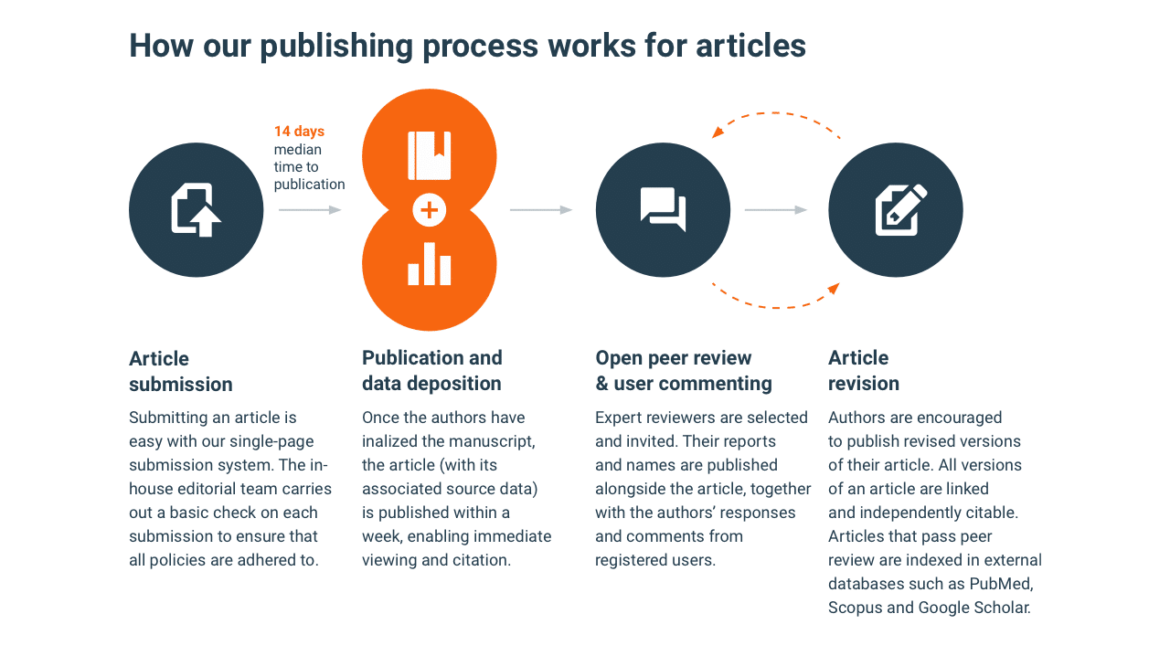What is F1000Research?
Publish your results rapidly with F1000Research
We champion choice for researchers world-wide, whatever your field of research, offering a range of options for publishing your work open access and ensuring trust, quality and impact.

Alongside our Taylor & Francis and Routledge open access journals, you can also choose to make your research available open access with F1000Research, an innovative open access publishing platform. With F1000Research you can publish your results rapidly. All content – including reviewer reports and source data – is openly available, maximizing the impact of these essential research outputs.
This guide covers:
What is F1000Research?
Why choose F1000Research for your research?
How to submit your work to F1000Research
Other F1000 subject- and funder-specific platforms
For rapid, open publication on F1000Research, submit your article now.
Publishing tips, direct to your inbox
Expert tips and guidance on getting published and maximizing the impact of your research. Register now for weekly insights direct to your inbox.
What is F1000Research?
F1000Research is an open research publishing platform, offering rapid publication of articles and other research outputs across physical and life sciences, engineering, medicine, social sciences and humanities.
As a researcher, your article will benefit from transparent, post-publication peer review and editorial guidance on making all source data openly available. F1000Research advocates for reproducibility and transparency in research, welcoming confirmatory and negative results, as well as null studies. All research is suitable irrespective of the perceived level of interest or novelty and articles are published without editorial bias.
6 reasons to submit your research to F1000Research
Publishing your work open access means it’s available for anyone, anywhere to read. This can help increase readership and drive its wider impact. There are also exciting benefits that F1000Research can bring, with its innovative open access publishing model providing new opportunities for publishing your work. Here are 6 reasons why F1000Research could be the perfect home for your research:
Rapid publication
The unique F1000Research publishing model allows for rapid publication. You could see your article published online in a fully citable format in just 14 days. For fast-moving fields of study, the time between submission and publication can be even shorter, with COVID-19 research currently prioritized above other content so it can publish more rapidly. So, you can get your research to the people who need it, quickly, and your research can start making a difference.
Openness and transparency
All content published on F1000Research is fully open access, including source data. Its open data policy means that all articles should include citations to repositories that host the data underlying the results, together with details of any software used to process results. The peer review process is also transparent. Here’s how it works:

Reviewer names and their reports are openly accessible and published alongside the article. Unlike other types of peer review, this means readers – not just the author – can benefit from the valuable feedback provided in reviewer reports.
Submit a wide range of article types
Alongside traditional research articles, you can submit a wide range of other article types to F1000Research, including:
Case reports
Data notes
Method articles
Opinion articles
Reviews
Study protocols
By publishing a range of formats, F1000Research helps you get recognition for work beyond the traditional research article.
Publish alternative research outputs
F1000Research also provides a permanent location for research-related outputs that don’t undergo peer review, including posters and slide decks, policy documents, and technical reports.
Posters, slide decks and documents can only be submitted via F1000Research Gateways. Each Gateway has its own eligibility criteria which you should check before submission.
Indexing in leading databases
Articles passing peer review benefit from indexing in a range of leading databases, including Scopus and PubMed, as well as appearing in Google Scholar. This increases the visibility and impact of articles, ensuring others can find them through scholarly platforms and networks.
Versioning: an easy way to keep your articles up to date
The F1000Research versioning system allows you to keep your articles up to date by publishing new versions sharing the latest developments in your work. Versions are all individually citable and clearly linked, making it easy for readers to navigate and cite the version they want.
How to submit to F1000Research
Software tool articles and data notes
Read guidelines on how to prepare and submit your research, including information on author eligibility and article processing charges. Articles are published as rapidly as possible after passing some initial pre-publication checks.
If you’ve already published your article on F1000Research or elsewhere, you can still publish articles specifically on the software and data to build on the story of your research. Software tool articles and data notes on F1000Research can help you boost the transparency and replicability of your work, as well as get credit for these valuable research outputs.

F1000 subject-and funder-specific platforms
F1000 also provides fully managed, open research publishing services directly to research funders, including the European Commission, Wellcome, and the Bill & Melinda Gates Foundation, as well as institutions, learned societies and other scholarly publishers such as Emerald Publishing.

You may be eligible to submit your research to an F1000 platform. Our platforms are independent, bespoke open research publishing venues with the same publishing model technology and benefits as F1000Research.
Subject-specific platforms
Cobot
Cobot publishes research in the interdisciplinary field of collaborative robots. As an open access platform, Cobot aims to share the results of innovative technologies with technicians, researchers, and experts engaged in this work.Materials Open Research
Materials Open Research publishes articles and other research outputs in all areas of materials science and materials engineering.Digital Twin
Digital Twin seeks to advance state-of-the-art, basic, scientific, and applied research on digital twin technologies. The multidisciplinary platform covers fields such as smart manufacturing, civil and industrial engineering, healthcare, and agriculture.MedEdPublish
An official journal of the Association for Medical Education in Europe, MedEdPublish serves academics, teachers, clinicians, researchers, and students in medical and health professions education.Molecular Psychology: Brain, Behaviour and Society
Molecular Psychology publishes research articles that utilize the tools of molecular biology to understand the specific molecular mechanisms that underlie behaviour and its associated neural systems.Stosunki Międzynarodowe – International Relations
Molecular Psychology publishes research articles that utilize the tools of molecular biology to understand the specific molecular mechanisms that underlie behaviour and its associated neural systems.
Funder specific platforms
AMRC Open Research
AMRC Open Research publishes articles and other research outputs funded by the AMRC member charities, supporter organizations, and affiliated institutions and networks.Gates Open Research
Gates Open Research publishes articles and other research outputs from projects funded by the Bill & Melinda Gates Foundation.HRB Open Research
HRB Open Research publishes scholarly articles from researchers funded, or co-funded, by the Health Research Board, Ireland.Open Research Europe
Open Research Europe publishes research articles stemming from Horizon 2020 and Horizon Europe funding, across all subject areas.Wellcome Open Research
Wellcome Open Research publishes articles and other outputs from research funded by Wellcome or its affiliated research centres.